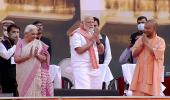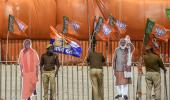'I had done 23 years of very satisfying service -- 10 years in the police and 13 years in the Enforcement Directorate.'
'I had done law enforcement and thought the next step should be towards contributing to make good laws.'

"It is wrong to allege that the ED is politically motivated," says Rajeshwar Singh, the newly elected MLA from Lucknow's Sarojini Nagar constituency.
Singh served ten years in the UP police and 13 years with the Enforcement Directorate where he investigated several high-profile controversial cases, including the Commonwealth Games, 2G Spectrum, Aircel-Maxis etc.
He sought voluntary retirement with 12 years of service left and joined the Bharatiya Janata Party just before the 2022 assembly election, winning his seat with a record margin.
Hailing from a family of bureaucrats -- his father was a gallantry award winning police officer; his wife Laxmi Singh, an IPS officer, is an inspector general of police posted in Lucknow; elder sister Abha Singh is a former Indian Postal Service officer and now a well known lawyer in Mumbai; brother-in-law Y P Singh is a former IPS officer and crusader against corruption; another brother-in-law Rajeev Krishna, IPS, is an additional director general of police posted in Agra while a niece Isha Singh is an IPS probationer.
In a telephone interview with Rediff.com's Archana Masih, Rajeshwar Singh speaks about making his constituency into a role model, dismisses the Opposition's accusation that the ED is a handmaiden of the government and points out why the BJP is a party for everyone.
The first of a two-part interview:
It has been a couple of months since you plunged into politics, what has been it like? What have been the surprises? Disappointments?
It's a very good and pleasant experience. The public has so much faith in the BJP and its policies. The public has reposed so much faith in me too because no one has ever won the Sarojini Nagar seat in Lucknow with such a margin.
I did not have too many days to campaign either. I just had 18 days. The entire battle of the Mahabharata was also fought in 18 days.
Those 18 days were enough for me and I could convince the people. We live in times of an active social media and everybody reads so much news that the public is very aware about the candidate, party policies and leadership.
I haven't had any problems.
What have you been busy with after becoming a first time MLA?
I am continuously meeting people to know their problems.
I am working at two levels -- one, is at the micro level, taking complaints of individuals or groups of people in different places.
My constituency is one of the biggest in Uttar Pradesh. It has rural as well as city areas. The problems in the rural areas are different from those of the city.
Hence, I'm entertaining complaints, meeting people, going to places to know their problems and writing letters to sort them out.
Secondly, I am finding out from the different agencies and government departments about the pending development schemes which need to be pursued.
Thirdly, making plans and talking to different agencies, private departments and corporates to come up with good schools, hospitals and better facilities that a constituency should have.
When did you decide to leave government and join politics? What was the motivation?
I had done 23 years of very satisfying service -- 10 years in the police and 13 years in the Enforcement Directorate.
I was awarded the President's Medal for gallantry which is the highest medal for a police officer.
In the Enforcement Directorate, even the highest court of India recognised my merit. They absorbed me and always appreciated the work I did.
My tenure in the government was very satisfying.
I then thought I should utilise my experiences in the government to make good laws. I had done law enforcement and thought the next step should be towards contributing to make good laws.
That is why I decided to plunge into politics. I'm so grateful to the BJP leadership that put so much confidence in me and gave me a ticket.
They supported me so much that I won.

Why the BJP? Did the party invite you? What particularly about the BJP's ideology attracted you to the party?
I found that this is the only part that does what it says in its manifesto.
They said we will abolish Article 370, triple talaq, build a Ram temple -- and they did.
It's a party whose ideology is Nation First. The other choice in UP was the Samajwadi Party which fields criminals and the corrupt. They gave tickets to the relatives of those who were in jail.
Hence, one can't even think of any other party but the BJP. The BJP is the only ideology based, disciplined party for whom the country comes first.
Prime Minister Narendra Modi, Home Minister Amit Shah and UP Chief Minister Yogi Adityanath are all men of integrity and passion. They are dedicated towards the country and can go to any extent for the country. That's really very inspiring.
In a recent interview, you highlighted the need for population control. Could you explain what precisely did you mean?
Uttar Pradesh had come up with a population policy and I support it. I think in the times to come it should become applicable. The demographic change taking place in UP, Assam, Bengal and Kashmir is very alarming. It has led to displacement of the population.
The population demography of eight districts in Western UP districts has changed. One community has grown by over 50%, which is not good. That is why people were leaving and getting displaced.
Kashmiri Pandits suffered because of demographic inequality in Kashmir. They were tortured and had to leave Kashmir. It has taken 30 years for them to be in a position to go back.
In Bengal, the minority population was 11%-12% at the time of the division of Bengal. Now, it is 30%.
Demographic change is not good for a state, a region and the country.
Hence, I feel there should be a population policy.

Do you think that Hindus must outnumber other faiths in every district?
No. The demography must not change. There has to be a demographic balance. At the moment, there is an imbalance which has led to the rise of radical elements.
Radicalism increases when there is an imbalance in population and demography. It is not good for any country.
As a former police officer, what are the security challenges that concern you?
Security is a very important aspect of life. The Yogi Adityanath government has restored the rule of law. Earlier, UP was known for its jungle and mafia raj.
Under the BJP government, more than 44,000 were booked under the Gangster Act. More than 750 criminals were booked under the National Security Act. More than 150 gangsters were liquidated in different encounters.
This has resulted in UP becoming a safe state now. Industries, foreign investment, MNCs are coming to UP. From the 14th position, it is now at second place in the ease of doing business. It is the second largest economy in India.
UP is growing and developing because of the rule of law which has been established and we have to take it forward.
We have to make it the most developed state and its economy should be number one in India.
Feature Presentation: Aslam Hunani/Rediff.com










